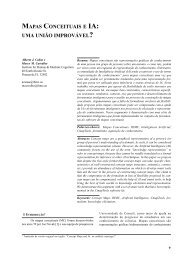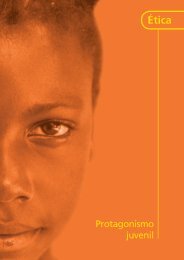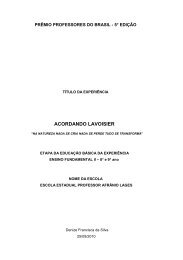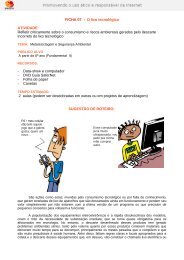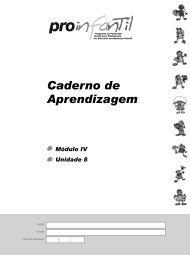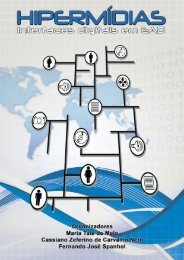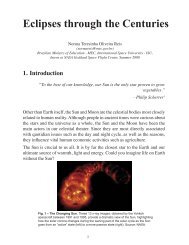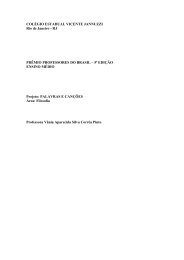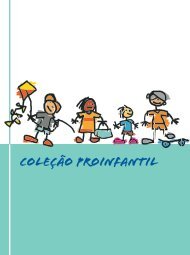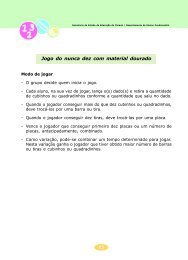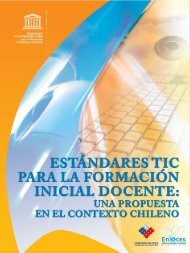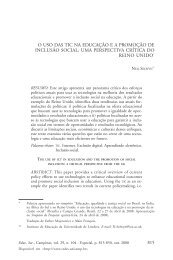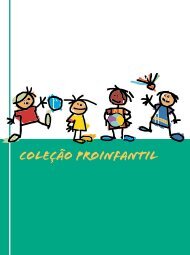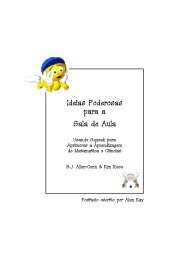BIO-CULTURAL COMMUNITY PROTOCOLS - Portal do Professor
BIO-CULTURAL COMMUNITY PROTOCOLS - Portal do Professor
BIO-CULTURAL COMMUNITY PROTOCOLS - Portal do Professor
Create successful ePaper yourself
Turn your PDF publications into a flip-book with our unique Google optimized e-Paper software.
PART III / CHAPTER 7<br />
2. Free, Prior and Informed Consent<br />
Within the context of the Convention on Biological<br />
Diversity (CBD), there is a tendency by parties to equate<br />
the idea of FPIC of ILCs only with the notion of consent<br />
in contract law. This perception is unduly limited. The right to<br />
FPIC in Article 8(j) in the context of bio-cultural communities<br />
rests on the twin foundations of the right to self-determination<br />
and customary law. The FPIC that Article 8(j) refers to is a<br />
consent that at its core affirms and furthers a bio-cultural<br />
way of life. Such consent stems from the bio-cultural values<br />
of ILCs, constituting an act of self-determination and affirming<br />
customary law. Article 8(j) indicates that the current<br />
environmental emergency is not a result of the inability of<br />
ILCs to freely alienate their ‘physical and intellectual property’<br />
to the highest bidder but stems from their diminishing ability<br />
to use and share their TK, lands, territories and natural resources<br />
in accordance with their bio-cultural values - values that have<br />
ensured the conservation and sustainable use of biological<br />
diversity through history.<br />
We turn briefly to explore each of the twin foundations of<br />
FPIC, namely, the right to self-determination and respect for<br />
customary laws and practices, and highlight their importance<br />
for ILCs to be able to secure their way of life.<br />
2.1 Self- Determination<br />
At the heart of the right to self-determination lies the challenge<br />
of articulating the ‘self’ that needs to be determined. The ‘self’<br />
that gives consent in contract law is rooted in property<br />
jurisprudence, which at a fundamental level splits the world<br />
into legal subjects and objects that can be traded and alienated<br />
by such subjects. This begs the question of whether the<br />
determining ‘self’ of bio-cultural communities that Article 8(j)<br />
refers to is the same ‘self’ that gives consent in contract law<br />
and whether such consent can ensure a way of life that has<br />
conserved and sustainably used biodiversity.<br />
The nature of the legal subject or the self in property<br />
jurisprudence is conceived of as an enclosed entity and the<br />
role of law is to resolve conflicts that arise out of competing<br />
rights between such entities and to safeguard their rights<br />
<strong>BIO</strong>-<strong>CULTURAL</strong> JURISPRUDENCE<br />
over objects which include land, property, knowledge etc.<br />
The legal subject is therefore separate from the thing s/he has<br />
rights over and ‘Nature’ for e.g. is separate from the ‘self’ or the<br />
legal subject who has rights over it. The legal subject has no<br />
obligations towards Nature nor <strong>do</strong>es Nature have<br />
corresponding rights over the legal subject. Nature in property<br />
jurisprudence is a commodity over which legal subjects<br />
exercise different sets of competing rights.<br />
The legal subject as separate from Nature emerges when a<br />
part of experience is cut from the general stream of experience<br />
and classified as the separate self. This allows for a different<br />
kind of relationship - one of self and other. Our ability to<br />
discriminate between self and Nature is merely one function<br />
of consciousness of splitting up our conscious universe into<br />
parts. But this ability to discriminate provides us with endless<br />
possibilities and not just a self/Nature binary.<br />
The state of duality between self/Nature and the state of unity<br />
where Nature becomes an extension of the self is a tension<br />
that constantly needs to be maintained to have a holistic<br />
picture of reality. This tension is crucial since it comprehends<br />
the essence of our consciousness that cuts up the<br />
undifferentiated stream of experience into a variety of binary<br />
combinations of subject/object, thought/thing, knower/known<br />
etc. The problem of the legal subject is the privileging of the<br />
subject/Nature binary at expense of its interconnectedness -<br />
the legal subject as separate from Nature is not an absolute<br />
but a functional category and this functional separation from<br />
Nature should not deny our integral connectedness. 2<br />
Article 8(j) poses a challenge to the classical notion of the<br />
legal subject as an insular bearer of property rights by<br />
juxtaposing it with the understanding that ILCs have of the<br />
‘self’ as a bio-spiritual relationship with the ecosystem. The ILCs<br />
that Article 8(j) refers to are bio-cultural communities whose<br />
cultural practices and spiritual beliefs are integrally tied to the<br />
ecosystem. The wellbeing of the community is contingent on<br />
the wellbeing of the ecosystem and the cultural rituals and<br />
spiritual foundations of the community continually make<br />
sacred and affirm the self’s connectedness to the land, its flora<br />
and fauna.<br />
2. James, William, ‘Does Consciousness Exist’, Essays in Radical Empiricism (1904) ; Nishida, Kitaro, An Enquiry into the Good, New Haven: Yale University Press,<br />
1990 and Banoobhai, Shabbir, If I Could Write,<br />
69



